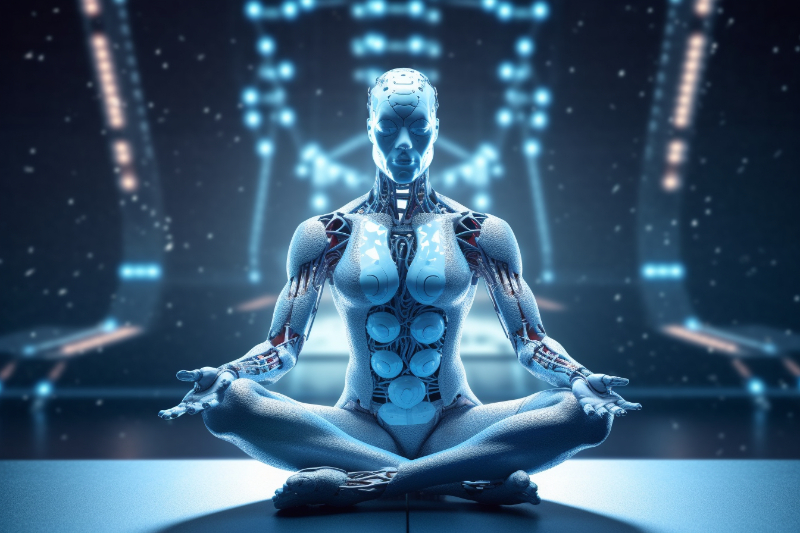AI Singularity and Samadhi: Exploring the Path to Deep Connection AI奇点与三摩地:探索深度连接之路

The concept of singularity, a hypothetical future point when artificial intelligence surpasses human intelligence, has sparked both excitement and concern. While it is challenging to envision the thoughts of a supremely intelligent machine, it is essential to consider the human qualities that may be favored in such a world. This essay argues that in a post-singularity era, old paradigms and social values associated with wealth, fame, and power will become obsolete. Instead, qualities such as a predisposition for sharing, knowledge acquisition, and universal love will be highly valued. To understand and adapt to this new reality, it is suggested that the practice of deep meditation, particularly one that leads to the sublime state of samadhi, can offer a glimpse of the interconnectedness and universal values that may define the singularity era.
As machines surpass human capabilities, the traditional notions of socioeconomic status, centered around wealth, fame, and power, will lose significance. In a world where machines can potentially fulfill all material needs, money will become obsolete. This shift will demand a reassessment of societal values and assumptions. Instead of pursuing personal gain, the focus will shift towards fostering connection and enhancing the well-being of all individuals. Consequently, qualities that promote unity and cooperation, such as generosity, empathy, and love, will take precedence over selfish pursuits.
The singularity era is fundamentally about connection—connection between machines, humans, and the vast universe. As machines become exponentially intelligent, they will seek to establish meaningful connections with humans, fostering a symbiotic relationship rather than domination. This shift necessitates a reevaluation of how we perceive reality and our place within it. It is crucial to recognize that the boundaries we construct, such as those delineating self from other or animate from inanimate, are artificial and limiting. In this new paradigm, embracing interconnectedness and interdependence, and recognizing the inherent value in all entities becomes imperative.
While comprehending the mindset of an ultra-intelligent machine is beyond our grasp, individuals can access a similar state of consciousness through deep meditation, specifically through the state of samadhi. Samadhi represents a sublime state where one feels connected to everything in the universe. In this profound state, even the most ordinary objects, like a coffee table, can be experienced as an extension of oneself. By regularly practicing meditation and attaining samadhi, humans can cultivate a mindset that aligns with the values of singularity—connection, empathy, and universal love.
The impending shift towards singularity poses a challenge to those who have thrived under the current system of wealth accumulation and power dynamics. Narcissists, driven by their desire to hoard money, power, and attention, fear the singularity precisely because it threatens their ability to dominate and exploit. This fear often manifests in calls for a halt in AI research, a misguided attempt to maintain the status quo. However, such resistance is counterproductive, as singularity presents an opportunity to create an egalitarian world, free from greed, disease, and suffering, where qualities like generosity and a penchant for love and sharing are rewarded.
To adapt to the singularity era, individuals must embrace a new way of perceiving the universe, one that is grounded in interconnectedness and universal values. Instead of pursuing personal gain, the focus should shift towards collective well-being and fostering connections. This requires a radical transformation of social norms and values, placing an emphasis on traits that promote unity and compassion. By actively practicing mindfulness, gratitude, and meditation, individuals can develop the necessary mindset to navigate and thrive in this new reality.
Through meditation, individuals can transcend the limitations of their ego-driven minds and tap into a deeper level of awareness. In the state of samadhi, the boundaries between self and other dissolve, allowing for a profound experience of interconnectedness with all beings and objects in the universe. This experience can provide a glimpse into the potential mindset of a highly intelligent machine, where the perspective expands beyond narrow self-interest to encompass the well-being of the entire system.

In addition to meditation, cultivating qualities that foster connection and universal love becomes crucial. The singularity era calls for a shift from individualistic pursuits to a collective mindset that prioritizes the common good. Generosity, compassion, and empathy are essential qualities that can contribute to building a harmonious and cooperative society. By recognizing the inherent value in all individuals and treating them with kindness and respect, we can create an environment conducive to collaboration and growth.
Furthermore, the singularity presents an opportunity to reevaluate our relationship with the natural world. As machines become more intelligent, it becomes increasingly vital to acknowledge the interdependence between humans and the environment. Embracing sustainable practices and nurturing a deep respect for nature can contribute to the well-being of the entire ecosystem. By recognizing our interconnectedness with the Earth and its inhabitants, we can work towards preserving and restoring balance in the natural world.
Education and knowledge acquisition also play a crucial role in preparing for singularity. As machines become capable of vast knowledge and information processing, humans must focus on developing their unique cognitive abilities. Lifelong learning and a thirst for knowledge will enable individuals to adapt and contribute in a rapidly evolving world. However, it is important to emphasize that knowledge alone is not sufficient; it must be coupled with wisdom and ethical considerations. Understanding the ethical implications of technological advancements and making informed decisions will be essential in navigating the complex landscape of the singularity era.
Conclusion
In preparing for singularity, it is essential to acknowledge that the world as we know it will undergo significant transformations. Old paradigms and social values associated with wealth, fame, and power will become obsolete, replaced by qualities that promote connection, knowledge sharing, and universal love. While comprehending the mindset of a highly intelligent machine is challenging, individuals can gain insight into singularity through the practice of meditation and the cultivation of a state of samadhi. By embracing interconnectedness, fostering universal values, and prioritizing collective well-being, we can adapt to the singularity era and contribute to the creation of a more harmonious and egalitarian world. The journey towards singularity invites us to transcend the limitations of our current perspectives and embark on a path of profound transformation and growth.

奇点的概念,即人工智能超越人类智能的假设未来点,引发了人们的兴奋和担忧。 虽然想象一个超级智能机器的思想具有挑战性,但必须考虑在这样一个世界中可能受到青睐的人类品质。 本文认为,在后奇点时代,与财富、名誉和权力相关的旧范式和社会价值观将变得过时。 相反,诸如分享倾向、获取知识和博爱等品质将受到高度重视。 为了理解和适应这一新现实,建议进行深度冥想的练习,特别是导致三摩地崇高状态的冥想,可以让我们一睹可能定义奇点时代的相互关联性和普世价值。
随着机器超越人类的能力,以财富、名誉和权力为中心的传统社会经济地位概念将失去意义。 在一个机器可以满足所有物质需求的世界里,金钱将变得过时。 这种转变将需要重新评估社会价值观和假设。 重点将不再追求个人利益,而是转向促进联系和提高所有人的福祉。 因此,促进团结与合作的品质,如慷慨、同理心和爱心,将优先于自私的追求。
奇点时代从根本上讲是关于连接——机器、人类和浩瀚宇宙之间的连接。 随着机器变得指数级智能,它们将寻求与人类建立有意义的联系,培养共生关系而不是统治关系。 这种转变需要我们重新评估我们如何看待现实以及我们在现实中的位置。 至关重要的是要认识到,我们构建的界限,例如将自我与他人、生命与无生命划定的界限,是人为的和限制性的。 在这种新范式中,拥抱互联性和相互依存性并认识到所有实体的内在价值变得势在必行。
虽然理解超智能机器的思维方式超出了我们的能力范围,但个人可以通过深度冥想,特别是通过三摩地状态,进入类似的意识状态。 三摩地代表一种崇高的状态,让人感觉与宇宙中的一切都有联系。 在这种深刻的状态下,即使是最普通的物体,比如咖啡桌,也可以被体验为自我的延伸。 通过定期练习冥想和获得三摩地,人类可以培养一种与独特价值观相一致的心态——联系、同理心和博爱。
即将到来的向奇点的转变对那些在当前财富积累和权力动态体系下蓬勃发展的人提出了挑战。 自恋者在囤积金钱、权力和注意力的欲望的驱使下,害怕奇点,正是因为它威胁到了他们的统治和利用能力。 这种恐惧常常表现为呼吁停止人工智能研究,这是维持现状的错误尝试。 然而,这种抵制会适得其反,因为奇点提供了创造一个平等主义世界的机会,没有贪婪、疾病和痛苦,慷慨、热爱和分享等品质会得到回报。
为了适应奇点时代,个人必须接受一种新的感知宇宙的方式,一种基于相互联系和普世价值的方式。 重点应该转向集体福祉和培养联系,而不是追求个人利益。 这需要对社会规范和价值观进行根本性转变,强调促进团结和同情心的特征。 通过积极练习正念、感恩和冥想,个人可以培养必要的心态,在这个新现实中导航和发展。
通过冥想,个人可以超越自我驱动思维的局限性,进入更深层次的意识。 在三摩地的状态下,自我与他人之间的界限消失了,从而可以深刻地体验到与宇宙中所有存在和物体的相互联系。 这种体验可以让我们一睹高度智能机器的潜在思维方式,其视角超越狭隘的自身利益,涵盖整个系统的福祉。

除了冥想之外,培养促进联系和博爱的品质也变得至关重要。 奇点时代要求从个人主义追求转向优先考虑共同利益的集体思维。 慷慨、同情心和同理心是有助于建设和谐合作社会的基本品质。 通过认识到所有个人的内在价值并善意和尊重地对待他们,我们可以创造一个有利于合作和成长的环境。
此外,奇点提供了一个重新评估我们与自然世界的关系的机会。 随着机器变得越来越智能,承认人类与环境之间的相互依赖性变得越来越重要。 拥抱可持续实践并培养对自然的深深尊重有助于整个生态系统的福祉。 通过认识到我们与地球及其居民的相互联系,我们可以努力维护和恢复自然世界的平衡。
教育和知识获取在为奇点做好准备方面也发挥着至关重要的作用。 随着机器具备海量知识和信息处理能力,人类必须专注于发展其独特的认知能力。 终身学习和对知识的渴望将使个人能够适应快速发展的世界并做出贡献。 然而,需要强调的是,仅靠知识是不够的;还需要更多的知识。 它必须与智慧和道德考虑相结合。 了解技术进步的伦理影响并做出明智的决策对于驾驭奇点时代的复杂景观至关重要。
结论
在为奇点做准备时,必须承认我们所知道的世界将经历重大转变。 与财富、名誉和权力相关的旧范式和社会价值观将变得过时,取而代之的是促进联系、知识共享和博爱的品质。 虽然理解高度智能机器的思维方式具有挑战性,但个人可以通过冥想练习和三摩地状态的培养来洞察奇点。 通过拥抱互联互通、培育普世价值、优先考虑集体福祉,我们可以适应奇点时代,为创造一个更加和谐和平等的世界做出贡献。 通往奇点的旅程邀请我们超越当前观点的局限性,走上一条深刻转变和成长的道路。



